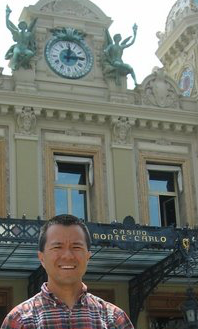Math 577 -- Monte Carlo Methods
Spring 2019

|
Instructor:
Kevin
Lin
Time: WF 1200-1315
Office: Math 606
Course web page (this page):
|
Announcements
(Last revised on November 05, 2019.)
-*-fill-column:65536-*- * Student papers - Brian Bell, A sampling method for detecting adversarial examples - Sara Bredin, Identifying gerrymandering through monte carlo methods - Loren Champlin, Finding counterfactual explanations using a modified simulated annealing - Kevin Luna, Stochastic modeling of chemical kinetics - Jessica Pillow, MCMC and quantitative image reconstructions - Craig Thompson, Pixel clustering with a Gaussian mixture model: Two algorithms - Ruiyang Wu, Introduction to exact sampling - Shenghao Xia, MCMC on neuron spike sorting model - Zhuocheng Xiao, Importance sampling for integrate-fire equations I have permission to share some of the papers. Plealse contact me (or the author!) directly if you are interested. * old announcements
This introductory course is aimed at graduate students in mathematics,
statistics, computer science, engineering, physical sciences,
quantitative biology, or really any field where Monte Carlo methods are
used. The goal is to equip students with knowledge of basic algorithms
and relevant theory so they can design and implement Monte Carlo
solutions to scientific problems and perform basic statistical analysis
on the output. As such, the course tries to balance between discussion
of practical algorithms and their mathematical analysis.
The first part of the course will cover
Interested students without this background are encouraged to see the
instructor prior to registering for the course.
The grade breakdown is as follows:
All these are either downloadable for free from the UA Library (just
follow the links below from a computer on the campus network, or use
VPN), or available from the authors.
The following standard textbooks on Monte Carlo are intended as primary
references. The mathematical level of the course is somewhere between
[RK] and [Liu]; [KW] is a good source for some of the topics we'll
discuss.
For sequential Monte Carlo, particle filtering, etc., see
This page was last updated on April 27, 2019.
Course description
Monte Carlo methods are numerical algorithms that use random sampling to
generate statistical estimates of (usually) deterministic quantities.
They are often more efficient than their deterministic counterparts,
especially for higher-dimensional problems, and are widely used in
scientific, engineering, and statistical computing.
Examples will be drawn from statistical mechanics, chemistry, Bayesian
statistics, and other fields, depending in part on student interest.
However, no background in these areas is assumed. The second part
covers more specialized topics. Possibilities include (but are not
limited to)
A detailed week by week plan will be posted on this page, and updated as
we go along.Prerequisites
Students should know probability at the undergraduate-level, e.g., Math
464 or equivalent, as well as linear algebra (e.g., Math 410 or
equivalent). Some of this material will be briefly reviewed, and
additional mathematical tools (e.g., theory of Markov chains) will be
covered as needed. Students are expected to carry out both
pencil-and-paper analysis and computer experiments, so facility in or
willingness to learn a programming language (e.g., Matlab, Python, R,
Julia, ...) is required.Grading
Grading will be based on a few problem sets (due every 2-3 weeks) and an
individual term project. Students will consult the instructor to choose
a suitable project topic; projects related to students' own research are
especially encouraged. Project results will be presented to the class
and summarized in a term paper, to be published on the course web
page at after the end of semester.
There are no written exams. However, project presentations may take
place during the final exam period.Syllabus
These are the topics I'm planning to cover. It may get will be
updated as we go along.
(Last revised on March 12, 2019.)
* PART I: Fundamentals
- Direct methods, e.g., transform and rejection methods
- Markov chain Monte Carlo (MCMC)
1. Basic Markov chain theory
2. Some standard MCMC algorithms
3. Error analysis
- Variance reduction, e.g., control variates, antithetic
variates.
- Importance sampling
* PART II: Selected Topics
- Rare event simulation
- Sequential MC and filtering
References
There is no required text, and I do not plan to follow any one text
closely. I do plan to assign reading from some of the books and lecture
notes listed below, in addition to course notes and papers to be posted
later in the term.
Additional general references:
In addition to the books above, there are two sets of lecture notes you
may find useful:
[M] provides a very readable introduction to some of the things we'll
cover, and [S] gives a clear, concise exposition of some key ideas in
Markov chain Monte Carlo.
For EnKF, see
Finally, for basic Markov chain theory, I like
 The contents on this site, including but not limited to all documents
and source code, are licensed under a Creative
Commons Attribution-Noncommercial-No Derivative Works 3.0 Unported
License.
The contents on this site, including but not limited to all documents
and source code, are licensed under a Creative
Commons Attribution-Noncommercial-No Derivative Works 3.0 Unported
License.